Iran Vows Support For Hamas' Attack On Israel Amid Rising Tensions

Iranian regime officials, parliament and state media have expressed their support for Hamas' large-scale attack on Israel, killing scores of civilians.

Iranian regime officials, parliament and state media have expressed their support for Hamas' large-scale attack on Israel, killing scores of civilians.
During their open session on Saturday, members of the Iranian Parliament showed their support for the militant incursion into Israel by chanting slogans, such as, "Palestine Will Win, Israel Will Be Destroyed."
Yahya Rahim Safavi, the former commander of the Islamic Revolutionary Guard Corps and military advisor to Iran’s Supreme Leader Ali Khamenei, also voiced his support for the terror group’s attack. He pledged “solidarity with Palestinians until the liberation of Palestine and Jerusalem.”
According to semi-officials ISNA news agency, he extended congratulations to Hamas forces and asserted that Former IRGC Quds Force Commander "Qassem Soleimani is undoubtedly with the mujahideen." However, he did not elaborate on how Iran's support for Hamas would manifest itself in the ongoing military conflict with Israel.
Earlier in the week, Iran's Supreme Leader, Ali Khamenei, criticized countries normalizing relations with Israel, characterizing it as a risky endeavor. He asserted that " The position of the Islamic Republic is that countries that make the gamble of normalization with Israel will lose. They are betting on a losing horse."
Media outlets associated with the Iranian regime have also embraced the news of Hamas's attack on Israel. Tasnim News Agency, affiliated with the IRGC, described Hamas's operation as a "significant blow to Israel" and touched upon the extensive number of Israeli casualties.
Likewise, IRNA, the official state news agency of the Islamic Republic, characterized Hamas's attack as "comprehensive," "complex," and "surprising." IRNA also noted that Hamas utilized drones during the attack to target Israeli positions.
Iranian-backed Palestinian Hamas launched a coordinated and large attack on Israel on Saturday, resulting in the loss of at least 40 Israeli lives and leaving over 500 people injured so far.
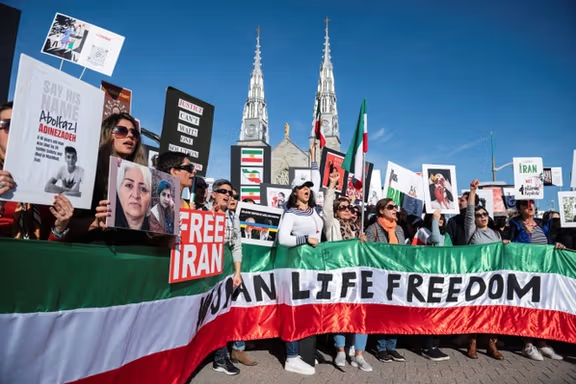
A grassroots group of lawyers and concerned Iranians in Canada is working to disrupt Iranian government influence operations in the country with the community’s help.
StopIRGC’s efforts, however, are insufficient to shut the open path the clerical regime in Tehran has managed to build into Canada. The Canadian government must take action, Mojedeh Shahriari, a cofounding member, told Iran International.
Since the death of Mahsa Amini in the hands of morality police in Tehran in September 2022, the coalition of lawyers has been trying to do its part to track the Islamic Republic’s agents, who spy on anti-regime activists, intimidate participants at "Woman, Life, Freedom" demonstrations and engage in money laundering and sanctions evasion on Canadian soil.
Shahriari described the Islamic Republic’s network in Canada as “similar to an international drug cartel”. She warned that they are even more dangerous than common criminals as they also try to make inroads into political and cultural spheres by influencing Canadian politicians at municipal, provincial and federal levels, as well as rallying Muslims in favor of their objectives through regime-linked Islamic centers.

Ramin Joubin, another StopIRGC cofounder, told Iran International that the group is hot on the heels of regime-related activities through at least four mosques in Alberta, Ontario and British Columbia.
The voluntary group is dependent on public reports about related suspicious activities, submitted by the Iranian community in Canada. According to Shahriari, the group “keeps receiving tips”, which they fact-check and subsequently use as basis of reports they prepare to send to authorities such as the police as well as immigration or border security in Canada.
“The reports people send us keep coming and our work is wholly dependent on those. Sometime sent anonymously, they provide a clue for us to pursue the cases,” she added.
The StopIRGC initiative, which officially started on a zero budget in 2022, has been welcomed by Iranian Canadians, “who have shown willingness in tracking, helping to expel” regime agents, said Shahriari.
The group's co-founder expressed satisfaction with law enforcement agencies such as the Royal Canadian Mounted Police (RCMP), which has been "relatively cooperative" with StopIRGC and has shown interest in their work. However, she criticized the government of Prime Minister Justin Trudeau for not providing sufficient support to a group dedicated to raising awareness about "this serious security issue" in Canada.
“There is no indication of the Canadian government’s resolve to even address this security threat,” Shahriari said. “I hope at least they raise RCMP’s budget so they can investigate Iranian spies in Canada, whether with our help or independently.”
Taking suspected individuals to court is specifically challenging due to privacy laws in Canada and the fact that many of them are already Canadian citizens, Joubin said.
“More than 50 percent of those we are investigating are already Canadian citizens, which makes pursuing the matter more challenging,” he said.
Shahriari also asserted that those suspected of working for the Iranian regime are “more daring than you would expect as their pockets are full of money,” which emboldens them when it comes to legal cases such as the ones StopIRGC is pursuing.

One relevant case being independently pursued by a lawyer associated with StopIRGC involves the defendant using intimidation tactics against the plaintiff, who is now a Canadian citizen living in the US, in an attempt to halt legal proceedings.
The ongoing legal case in Calgary initially revolved around the defaulting of an 18-bitcoin debt borrowed by an Iranian owner of an exchange shop in Canada. However, as the plaintiff and their lawyer delved deeper into the matter in their pursuit to recover the money, they started uncovering what they allege to be a money laundering operation with connections to the Iranian regime. The plaintiff shared these details with Iran International on the condition of anonymity.
The defendant, whose father used to work in the oil sector during former President Mahmoud Ahmadinejad’s government, is just a benchman in a group of more powerful people allegedly working for the regime, the plaintiff believes.
Joubin, who is aware of some details of the case, said there are serious accusations of money laundering, sanctions evasion, and intimidation and that the defendant has filed for bankruptcy, a claim that Canadian authorities have already debunked.
The case is an instance of many other civil, defamation, criminal, and even family cases StopIRGC is looking into. The group is planning to release more details about their work this month.
StopIRGC cofounders asserted that following up on such legal procedures is a lengthy process, particularly when it comes to the more immediate dangers the regime’s network poses, such as infiltration into Iranian dissident factions in Canada.
Despite all the efforts in its one-year history, StopIRGC has not yet managed to help expel any regime agents, yet the members hope that their increasingly growing database would some day pave the way in abolishing the Islamic Republic’s foreign interference in Canada.
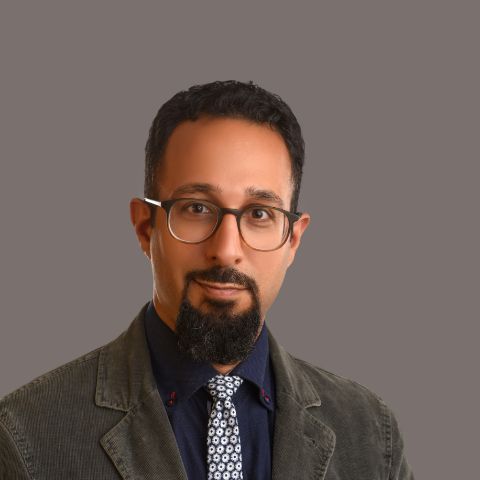
The group is already investigating multiple people suspected of working for Iran’s regime, who have shown up at protests to intimidate protesters and gather intelligence on the crowd, which is a common practice by the Islamic Republic, and well known by the Iranian diaspora across the world.
“There is this one case I’m investigating about a suspected person who showed up at an anti-regime protest in Vancouver and even spoke to the crowd in the guise of a dissident,” Shahriari said, stressing that these agents know how to dress and behave not to be mistaken as regime sympathizers.
According to the cofounders, the dissidents are intimidated via a series of tactics including stalking, trespassing into their properties and sometimes direct physical assault. The scale and scope of such threats are not only limited to Canada as the dissidents’ relatives are targeted inside Iran to exert pressure on them.
The threats posed by Iran’s regime might not seem immediate, Shahriari said, but the Islamic Republic and the IRGC are “a terrorist threat to the whole world and their presence here is guaranteed to cause serious troubles in Canada sooner or later”.
Some Canadian politicians have already made efforts to proscribe the IRGC, including in the Senate following numerous calls by Iranian activists, warning about the dangers they pose to Canadians.
In July 2022, Trudeau said Canada has designated IRGC leadership in response to crackdown on popular protests in Iran, yet activists have been signaling that the measure is insufficient.
While StopIRGC remains influential in lessening the risks and raising awareness about the issue, it does not have the means to deal with all the agents “who keep arriving in Canada”, Shahriari said, voicing hope that the next government would finally take on the task of proscribing the Guards as a terrorist entity.
Pierre Poilievre, the leader of Canada’s Conservative Party, running to be the next prime minister, vowed in late August to “kick out” IRGC if he wins office.
“If IRGC is listed as a terrorist organization, police will be obliged to take them on, and they will be tried as members of a terror organization. That should be the main effort,” Shahriari said, adding, “Meanwhile, all we can do is to investigate them further and continue to put pressure on the Trudeau government to take action against the IRGC and other Islamic Republic's agents in Canada.”
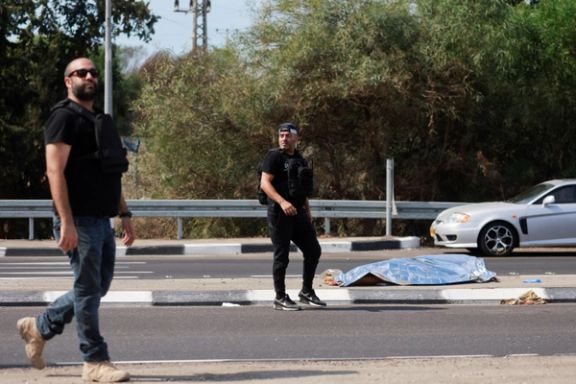
World leaders quickly came out in support of Israel, claiming it has the right to defend itself after a mass attack from the Palestinian terror group Hamas.
From 6am Saturday, both the holy Sabbath and the Jewish festival of Simchat Torah, the attack saw around 5,000 rockets fired in under one hour and at least dozens of Hamas terrorists infiltrate Israeli territory by land, sea and air.
French President Emmanuel Macron said on X, "I strongly condemn the current terrorist attacks against Israel. I express my full solidarity with the victims, their families and loved ones."
The British premier also defended the Jewish state, which was taken by surprise by the early morning attacks which have left hundreds wounded, dozens dead and several more, including women and children, taken hostage in Gaza.
He spoke of his shock at the brutality of attacks which saw civilians gunned down in the street and taken hostage and killed in their homes, adding, "Israel has an absolute right to defend itself."
In Europe, Netherlands' premier also showed support to Prime Minister Benjamin Netanyahu who on Saturday announced a state of war. Mark Rutte called the attack "unprecedented", adding, "I told him that the Netherlands unequivocally condemns this terrorist violence and fully supports Israel’s right to defend itself."
At the time of publication, at least 22 Israelis were known to be dead with scores more expected as the numbers become clearer.
Fellow Iran-backed proxy, Hezbollah, issued a statement in support of the action, claiming it was in direct contact with Hamas and other proxy groups. In its statement, the group claimed the attacks were a "decisive response to Israel's continued occupation and a message to those seeking normalization with Israel", in a barbed attack on Saudi Arabia, whose relations have been ramping up in recent weeks amid talk of a US-brokered deal.
However, the Saudi foreign ministry, chose to tow the Arab world line, refraining from supporting Israel or condemning Hamas, merely saying it was watching the situation and urging both sides to refrain from escalation.
Other statements of condemnation were pouring in from across nations including Poland, Greece, Belgium and the Czech Republic.
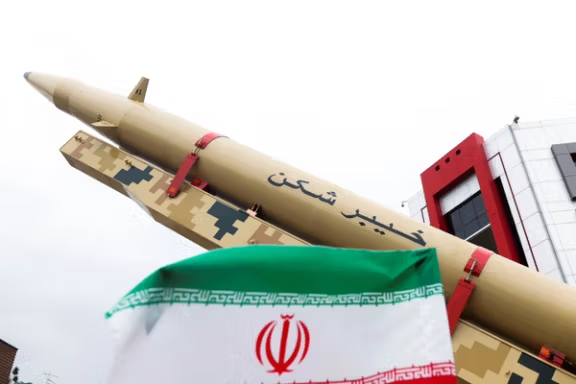
The EU said in a statement that Britain, France, and Germany do not intend to lift the sanctions against Iran, which were supposed to expire on October 18th.
Josep Borrell, the European Union's Foreign Policy Chief, announced in a statement on Friday that he has received a letter from the foreign ministers of France, Germany and the United Kingdom informing him about an issue concerning the implementation of Iran’s commitments under the Joint Comprehensive Plan of Action (JCPOA).
“The Foreign Ministers stated that Iran has been in non-compliance since 2019 and considered that this has not been resolved through the JCPoA’s Dispute Resolution Mechanism (DRM). They expressed their intention not to take the steps regarding the lifting of further sanctions on JCPoA Transition Day on 18 October 2023,” reads the statement.
Borrell's reference is to one of the sunset clauses of the JCPOA, according to which on October 18, the sanctions imposed by the European Union against Iran, which included missile and arms sanctions, were supposed to be lifted.
Based on Annexes of UN Security Council Resolution 2231, the European Union had agreed to lift the sanctions on Iran in the eighth year of the JCPOA's implementation.
One year after former US President Donald Trump decided to unilaterally withdraw from the JCPOA and impose sanctions on Tehran, Iran gradually stepped away from its commitments within the framework of the JCPOA by increasing the level of uranium enrichment.
Negotiations to revive the JCPOA, aimed at bringing Iran to its commitments within the agreement, came to a halt last year without results. After the failure of the talks, the United States accused Iran indirectly of non-JCPOA-related demands.
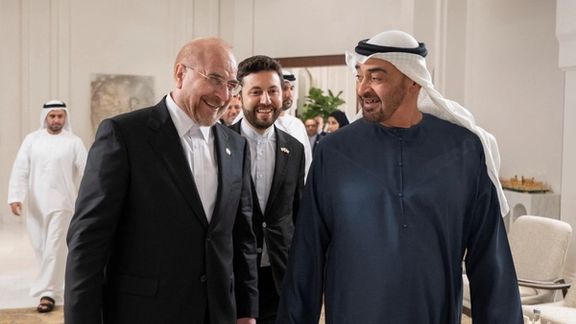
Iran should make a more concerted effort to circumvent sanctions, Speaker of Parliament, Mohammad Bagher Ghalibaf, told a gathering in Tehran on Friday.
Ghalibaf, a former senior commander of the Revolutionary Guard and a politician close to the family of Iran’s ruler Ali Khamenei, addressed the issue while speaking on Friday to a group of Iranian businessmen while visiting the United Arab Emirates. He criticized lack of coordination “between the government and the private sector to neutralize sanctions.”
Ghalibaf told the Iranian businessmen, “Sanctions are a political matter that certainly needs to be pursued in the field of foreign policy, and actions are being taken in this regard. Another issue is neutralizing sanctions, which both the public and private sectors must reach a common understanding on.”
While Iranian officials have been demanding the lifting of US economic sanctions, they have also consistently underlined the necessity to circumvent the restrictions. In October 2018, Khamenei said Iran will "slap" the United States by defeating US sanctions on Iran’s oil exports and international banking imposed a few months earlier by the Trump administration, after it withdrew from the Obama-era JCPOA nuclear deal. "With the grace of God, we will defeat sanctions. And the defeat of sanctions is the defeat of America," Khamenei said.
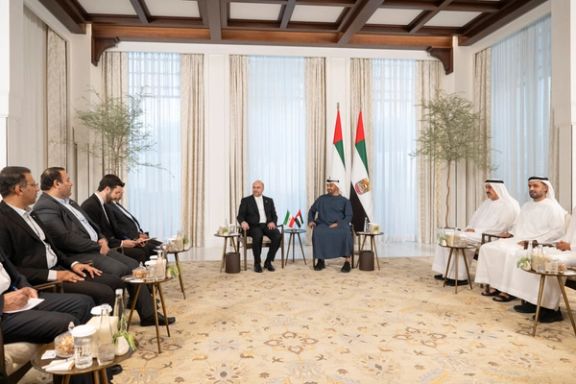
US sanctions held steady during the Trump years, and Iran’s oil exports dropped to as low as 250,000 barrels a day compared with more than 2 million before the sanctions, but Tehran managed to gradually increase shipments after President Joe Biden won the 2020 election.
Ghalibaf stressed that the Iranian government should coordinate better with private firms “outside Iran” to bust the sanctions, a reference to the significant role Iranian expatriate businessmen can play, especially in the United Arab Emirates.
Although the Biden administration has periodically sanctioned individuals and firms secretly helping Iran in its illicit trade activities, the pressure apparently has not been enough, driving Tehran’s oil exports to 1.8 million barrels per day in mid-2023. Companies in the region, including in the UAE have acted as middlemen in arranging illicit Iranian oil shipments to Asia and even laundering the money back to Tehran.
In August 2022 for example, the United States imposed sanctions on Chinese and other firms it said helped to sell tens of millions of dollars in Iranian oil and petrochemical products to East Asia.
But recently, the Biden administration agreed to allow the release of a whopping $8.7 billion in frozen Iranian funds in exchange for freeing five US hostages held in Iran. The move not only brought a windfall for Tehran but according to critics could endanger more Americans in the future.
However, the Speaker of Iran’s parliament urged expatriate businessmen to attempt to circumvent US sanctions, which in essence could jeopardize the interests of the host country, in this case the UAE.
“There are ways to neutralize sanctions," he said. "Unfortunately, the public and private sectors of the country have not been able to coordinate themselves to neutralize sanctions, and as a result, this coordination should also take place outside the country. Therefore, this coordination needs to be closely, deliberately, intelligently, swiftly, and precisely carried out. There is no insurmountable task in this field, and the only issue is the lack of coordination and organization between the private and public sectors.”
Ghalibaf went further and called for more efforts involving the UAE to circumvent the sanctions. "Unfortunately…In this regard, one of the areas that has received less attention is our communication with neighboring countries, especially the United Arab Emirates, which has historically been one of the pillars of our trade in both the public and private sectors."

The UN Human Rights Council has announced that its fact-finding committee on Iran is probing the reported assault on a 16-year-old girl, who is in coma at a Tehran hospital.
Armita Geravand suffered a severe head injury when reportedly hijab enforcers used physical force in the subway on October 1 because she was not wearing a headscarf.
UNHRC stated, "We are investigating the reported assault of 16-year-old Armita Geravand for alleged non-compliance with mandatory hijab laws, one year after the death in custody of Mahsa Amini. Women's right to equality must be upheld."
Amnesty International has also urged the global community to press Iranian authorities to permit an independent international delegation, including United Nations experts, to investigate the circumstances leading to Geravand’s coma after reports of an attack by compulsory hijab enforcers.
Diana Eltahawy, Amnesty International’s Deputy Regional Director for the Middle East and North Africa, stated, “Iranian authorities are waging a concerted campaign of denial and distortion to cover up the truth about the circumstances that led to Armita Garawand’s collapse, chillingly reminiscent of their bogus narratives and unplausible explanations of Mahsa/Zhina Amini’s hospitalization just over a year ago.”
Josep Borrell, the European Union's foreign policy chief, also expressed concern about Geravand’s deteriorating health, responding to an Iran International reporter in Berlin. He emphasized that reports suggest her situation resulted from a confrontation with hijab enforcement authorities and underscored that if confirmed, it would be unacceptable and unjustifiable.